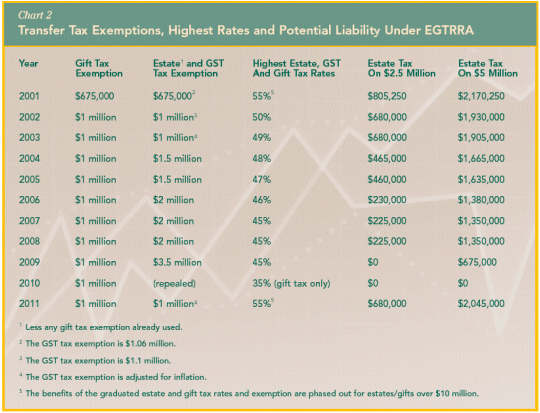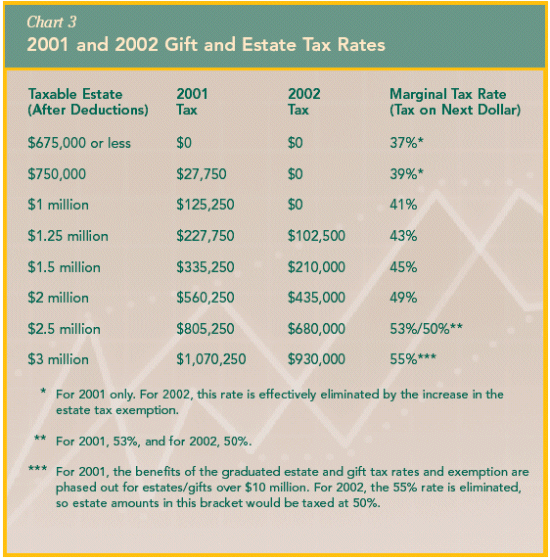Determining the Estate Tax

The next step is to understand some estate tax basics. First you need to get an idea of what your estate is worth and whether you need to worry about estate taxes, both under today’s rates and as exemptions increase under EGTRRA.
How Much Is Your Estate Worth?
The first step is to add up all of your assets. Use Chart 1, and include cash, stocks and bonds, notes and mortgages, annuities, retirement benefits, your personal residence, other real estate, partnership interests, automobiles, artwork, jewelry, and collectibles. If you are married, also include your spouse’s assets.

If you own an insurance policy at the time of your death, the proceeds on that policy usually will be includable in your estate. Remember: That’s proceeds. Your $1 million term insurance policy that isn’t worth much while you’re alive is suddenly worth $1 million on your death. If your estate is large enough, a significant share of those proceeds may go to the government as taxes, not to your chosen beneficiaries, though the estate tax impact will decrease gradually under EGTRRA. (See Chart 2.)

How the Estate Tax System Works
Here’s a simplified way to compute your estate tax exposure. Take the value of your estate, net of any debts. Also subtract any assets that will pass to charity on your death—such transfers are deductions for your estate. Then if you are married and your spouse is a U.S. citizen, subtract any assets you will pass to him or her. Those assets qualify for the marital deduction and avoid estate taxes until the surviving spouse dies. (If you are single or your spouse is not a U.S. citizen, turn to pages 24 and 25 for more information.) The net number represents your taxable estate.
You can pass up to the exemption amount during your life or at death free of gift and estate taxes. This amount will increase until the estate tax is eliminated in 2010. (See Chart 2.) But note that the gift tax exemption does not increase beyond $1 million, and even in 2010, the gift tax is not repealed—so lifetime gifts of more than $1 million will be subject to tax.
If your taxable estate is equal to or less than the exemption and you haven’t already used any of the exemption on lifetime gifts, no federal estate tax will be due when you die. But if your estate exceeds this amount, it will be subject to estate tax. (See Chart 3 for 2001 and 2002 marginal rates.) The top rate will gradually decrease through 2007. (See Chart 2.)

Material discussed is meant for general illustration and/or informational purposes only and it is not to be construed as tax, legal, or investment advice. Although the information has been gathered from sources believed to be reliable, please note that individual situations can vary therefore, the information should be relied upon when coordinated with individual professional advice.
Article from CalcXML.com
